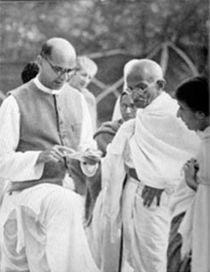World War II and “Quit India”

Mahadev Desai (left) reading out a letter to Gandhi from the viceroy at Birla House, Mumbai, April 7, 1939
When
World War II broke out in 1939, Gandhi was initially in favor of "non-violent moral support" for the British. Other Congress leaders, however, were offended that the viceroy had committed India in the war effort without consultation, and resigned en masse.
[11] After lengthy deliberations, Indian politicians agreed to cooperate with the British government in exchange for complete independence. The viceroy refused, and Congress called on Gandhi to lead them. On August 8, 1942, Congress passed a “Quit India” resolution, which became the most important move in the struggle for independence. There were mass arrests and violence on an unprecedented scale.
[12] Thousands of freedom fighters were killed or injured in police firing, and hundreds of thousands were arrested. Gandhi clarified that this time the movement would not be stopped if individual acts of violence were committed, saying that the "ordered anarchy" around him was "worse than real anarchy." He called on all Congressmen and Indians to maintain discipline in
ahimsa, and
Karo Ya Maro (“Do or Die”) in the cause of ultimate
freedom.
Gandhi and the entire Congress Working Committee were arrested in Bombay (
Mumbai) by the British on August 9, 1942. Gandhi was held for two years in the Aga Khan Palace in Pune. Although the ruthless suppression of the movement by British forces brought relative order to India by the end of 1943, Quit India succeeded in its objective. At the end of the war, the British gave clear indications that power would be transferred to Indian hands, and Gandhi called off the struggle, and the Congress leadership and around 100,000 political prisoners were released.
During his time in prison, Gandhi's health had deteriorated, however, and he suffered two terrible blows in his personal life. In February 1944, his wife Kasturba died in prison, and just a few months earlier Mahadev Desai, his 42-year old secretary, died of a heart attack. Six weeks after his wife’s death, Gandhi suffered a severe malaria attack. He was released before the end of the war because of his failing health and necessary surgery; the British did not want him to die in
prison and enrage the entire nation beyond control.
